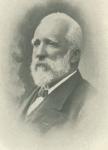The eldest surviving son of English scholar John Nicholson, an orientalist, theologian and linguist, John Henry Nicholson was educated privately and at Croft House Academy, Brampton, Cumberland. He came to Australia at age 16 and over the next few years worked at various occupations including whaling and gold prospecting before returning home briefly.
In 1859 Nicholson sailed once again for Australia, this time settling in Queensland, initially in Toowoomba, where he briefly operated his own private school. The following year he married German-born Anna Wagner (they had no children but adopted a daughter) and moved to nearby Warwick to take up employment as a tutor. He started another private school in 1863, but moved to Brisbane two years later after joining the Board of General Education. This subsequently led to him taking charge of schools at Nundah (1865-1868), Springsure (1870-1876) and Enoggera (1877-1885).
While working as a teacher the somewhat eccentric Nicholson managed to publish at four small volumes of prose and verse (the first two were published using the pseudonyms 'Tadberry Gilcobs' and the second as 'Salathiel Doles). In 1882 the book largely associated with his name was released in London. Titled
The Adventures of Halek, and inspired in part by John Bunyan's
Pilgrim's Progress, the story is essentially an allegory which communicates the idea of man's development from sinful worldliness to ideal goodness. Philip J. Roberts, writes that 'although it attracted much praise from some critics and went through further editions in Brisbane in 1896 and 1904, Halek was never a success and its sequel,
Almoni (Brisbane, 1904), fared no better. Both works had fine sentiments and a dignified harmonious style but were too remote from everyday life to have much impact.
In 1885 Nicholson resigned from the Board of General Education in order to open another private school, this one being located in Enoggera. Having begun to suffer increasingly from bouts of melancholia, he was forced to leave the school in 1891 in order to recuperate for most of the year in a Goodna mental hospital. He returned to teaching between 1892 and 1897 before being appointed registrar of births, marriages and deaths at Nundah. In 1905 Nicholson remarried, his first wife having died in 1901. His second wife, Anna Cordes, was also German, and reportedly had become attracted to Nicolson while translating Halek for publication in her native country. Three months after the marriage, however, Nicholson was readmitted to the Goodna mental hospital and remained there except for occasional intervals until his death.
Nicholson was a frequent contributor to Queensland newspapers, published
several books of miscellaneous verse and prose, and with other
Queensland writers such as
Horace Earle and
William Senior, was involved in a 'Johnsonian' literary club established in Brisbane in 1878.
[Source: The above biography has been sourced in part from Percival Serle's entry in the
Dictionary of Australian Biography (1949) and Philip J. Roberts' entry in the
Australian Dictionary of Biography (1974)]

